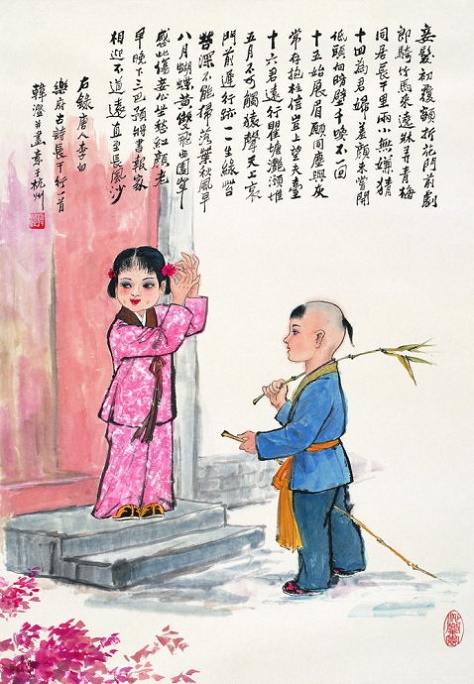A Song of Changgan
- Poetry of Li Bai (Li Po)

My hair had hardly covered my forehead.
I was picking flowers, paying by my door,
When you, my lover, on a bamboo horse,
Came trotting in circles and throwing green plums.
We lived near together on a lane in Ch'ang-kan,
Both of us young and happy-hearted.
...At fourteen I became your wife,
So bashful that I dared not smile,
And I lowered my head toward a dark corner
And would not turn to your thousand calls;
But at fifteen I straightened my brows and laughed,
Learning that no dust could ever seal our love,
That even unto death I would await you by my post
And would never lose heart in the tower of silent watching.
...Then when I was sixteen, you left on a long journey
Through the Gorges of Ch'u-t'ang, of rock and whirling water.
And then came the Fifth-month, more than I could bear,
And I tried to hear the monkeys in your lofty far-off sky.
Your footprints by our door, where I had watched you go,
Were hidden, every one of them, under green moss,
Hidden under moss too deep to sweep away.
And the first autumn wind added fallen leaves.
And now, in the Eighth-month, yellowing butterflies
Hover, two by two, in our west-garden grasses
And, because of all this, my heart is breaking
And I fear for my bright cheeks, lest they fade.
...Oh, at last, when you return through the three Pa districts,
Send me a message home ahead!
And I will come and meet you and will never mind the distance,
All the way to Chang-feng Sha.
Folk-song-styled-verse
This narrative poem by Tang dynasty poet Li Bai depicts the emotional journey of a young woman from Changgan—from childhood through marriage to her longing after her husband's departure. Changgan, a thriving residential area in ancient Nanjing since the Eastern Wu dynasty, became renowned during the Tang dynasty as a merchant hub. As commerce flourished, more merchant wives emerged in Changgan, their lives becoming poetic subjects, with this work being the most famous. Through vivid and delicate strokes, the poet portrays the young wife's profound longing for her husband, presenting a simple yet sincere love.
妾发初覆额,折花门前剧。
郎骑竹马来,绕床弄青梅。
同居长干里,两小无嫌猜。
十四为君妇,羞颜未尝开。
低头向暗壁,千唤不一回。
十五始展眉,愿同尘与灰。
常存抱柱信,岂上望夫台。
十六君远行,瞿塘滟预堆。
五月不可触,猿声天上哀。
门前迟行迹,一一生绿苔。
苔深不能扫,落叶秋风早。
八月蝴蝶黄,双飞西园草。
感此伤妾心,坐愁红颜老。
早晚下三巴,预将书报家。
相迎不道远,直至长风沙。
- Why Chinese poems is so special?
- The most distinctive features of Chinese poetry are: concision- many poems are only four lines, and few are much longer than eight; ambiguity- number, tense and parts of speech are often undetermined, creating particularly rich interpretative possibilities; and structure- most poems follow quite strict formal patterns which have beauty in themselves as well as highlighting meaningful contrasts.
- How to read a Chinese poem?
- Like an English poem, but more so. Everything is there for a reason, so try to find that reason. Think about all the possible connotations, and be aware of the different possibilities of number and tense. Look for contrasts: within lines, between the lines of each couplet and between successive couplets. Above all, don't worry about what the poet meant- find your meaning.